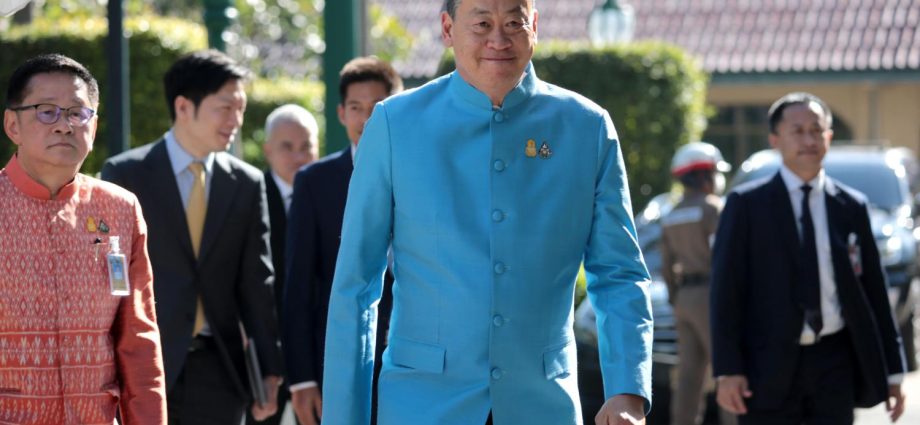Urges BoT panel to fast-track meeting

Prime Minister Srettha Thavisin has urged the Bank of Thailand’s (BoT) Monetary Policy Committee (MPC) to call a special session to consider cutting interest rates without having to wait until April.
Speaking after Tuesday’s cabinet meeting, Mr Srettha said he had not leaned on the secretary-general of the National Economic and Social Development Council (NESDC) to pressure the central bank.
“I have not given the secretary-general any orders. He has also confirmed this. This concerns the independence of agencies, including the Bank of Thailand. I have no authority to tell them what to do.
“But I want to say that being independent does not mean you can ignore people’s hardship,” Mr Srettha said.
“Regarding my earlier post on X, I wanted the MPC to call an urgent meeting to consider cutting interest rates because the NESDC has new information.
“The next meeting [of the MPC] will take place in April. So we’ll have to wait another two months. I want to ask the committee to consider [holding the meeting sooner],” the prime minister said.
The NESDC has revised down its GDP growth target for 2023 and its outlook for 2024 to 1.9% and 2.7%, respectively, suggesting the BoT use financial measures to support the economy, according to NESDC secretary-general Danucha Pichayanan.
On Monday, the NESDC announced its latest projections for economic growth in 2023 and 2024, which were lower than its previous forecasts of 2.5% and 2.7-3.7%.
Mr Danucha said that to help propel the economy and reduce the burden on households and small and medium-sized enterprises (SMEs), the central bank should seriously consider measures to reduce rates, in particular, the net interest margin (NIM), which is currently high at around 5%.
“In the recent past, the government undertook many stimulus measures to revive tourism, support investment, and expedite the disbursement of the state budget. As a next step, it should use financial measures to support the economy,” Mr Danucha said.
The NESDC wants financial institutions to reduce the NIM to help SMEs and households with their debt burden. The NIM has no significant impact on large businesses.
Mr Danucha said the central bank should extend its debt assistance measures by maintaining the minimum repayment rate for credit card debt at 5%, after the deadline expired in December. The current rate of 8% will mean more non-performing loans (NPLs) among SMEs and householders, he said.
Mr Danucha said again Tuesday that he urged the BoT to cut rates because the economic figures were lower than the NESDC’s previous forecasts, while more special mention (SM) loans, defined as loans overdue for 1-3 months, are becoming NPLs.
“I think the NESDC should hold talks with the BoT. Having said that, the NESDC has not been pressured by the prime minister,” Mr Danucha said.
On Feb 7, the MPC decided to maintain its policy rate at 2.5% and trim its 2024 growth projection to 2.5-3%.
MPC secretary Piti Disyatat said the economy is projected to slow in 2024 as exports and manufacturing activity ease amid softening global demand and moderating growth in China.
Structural headwinds are restraining merchandise exports and tourism more than expected, he said.
This slower initial momentum points to a softer outlook for 2024 growth, projected to be 2.5-3% under a base-case scenario without the digital wallet scheme being implemented, noted the committee.
The downward growth revision for this year follows weak expansion both for full-year 2023 and the fourth quarter in particular.
Mr Srettha said he did not agree with the decision to keep the policy rate at a 10-year high of 2.5%.
“I want fiscal and monetary policy to work together, but I have no power to interfere with the bank’s duties,” he said.

